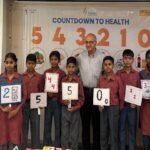New Delhi, 30 July, 2017: Statistics indicate that about 700 million people in India inhale smoke from biomass and kerosene stoves and other sources that spew carbon particles, carbon monoxide, nitrous oxides, sulphur oxides, formaldehyde and cancer-causing substances such as benzene. This smoke is a leading cause of asthma in the country. Estimates by the WHO show that between 15 and 20 million people have asthma in India, and the numbers do not show any signs of decreasing.
Studies also indicate that the prevalence is higher in children as they have smaller airways which become constricted due to all the pollutants. Schoolchildren are the worst affected and many are growing up with irreversible lung damage. All this can be blamed on the rising pollution levels which cause fatal lungs disorders, severe respiratory problems, nausea, palpitation, loss of vision, blood pressure, and fatigue.
Speaking about this, Padma Shri Awardee Dr K K Aggarwal, National President Indian Medical Association (IMA) and President Heart Care Foundation of India (HCFI) and Dr RN Tandon – Honorary Secretary General IMA in a joint statement, said “Asthma is a chronic respiratory disorder triggered by allergic reactions. It leads to breathing difficulties as a result of narrowing of the bronchial passage, which is responsible for carrying oxygen to the lungs. Asthma can have two affects: swelling in the lungs due to accumulation of mucus in the airways; and inflammation due to tightening of the muscles around the airways. What exacerbates the situation is that asthma is often mistaken as a recurrent cough. Due to this, it is not taken seriously or treated with cough syrups. In kids, it is difficult to assess symptoms because they may not show the typical symptoms of asthma such as breathlessness, wheezing, coughing, and chest tightness. Besides, every child’s asthma is different.”
Certain triggers can make an asthma attack worse. Once asthma is diagnosed in a child, it is imperative to remove triggers from the house or keep the child away from these.
Adding further, Dr Aggarwal, said, “Young children may not understand how chronic this condition is or how it can affect their daily life. Education is the key here. Parents of children with asthma should ensure that the child is well aware of his/her condition and teach them steps to be followed during a possible emergency.”
Some tips for managing asthma and associated symptoms in children are as follows.
- Help them take medications daily without fail.
- Visit the doctor regularly.
- Give them only the prescribed medicines.
- Take precautionary measures to avoid any triggers.
- Always carry their inhaler with you and encourage them to never feel shy to use it in public.
- Inform the doctor if any other health ailment is bothering the child.
- Lastly, help them reduce stress and try to remain calm and happy.







